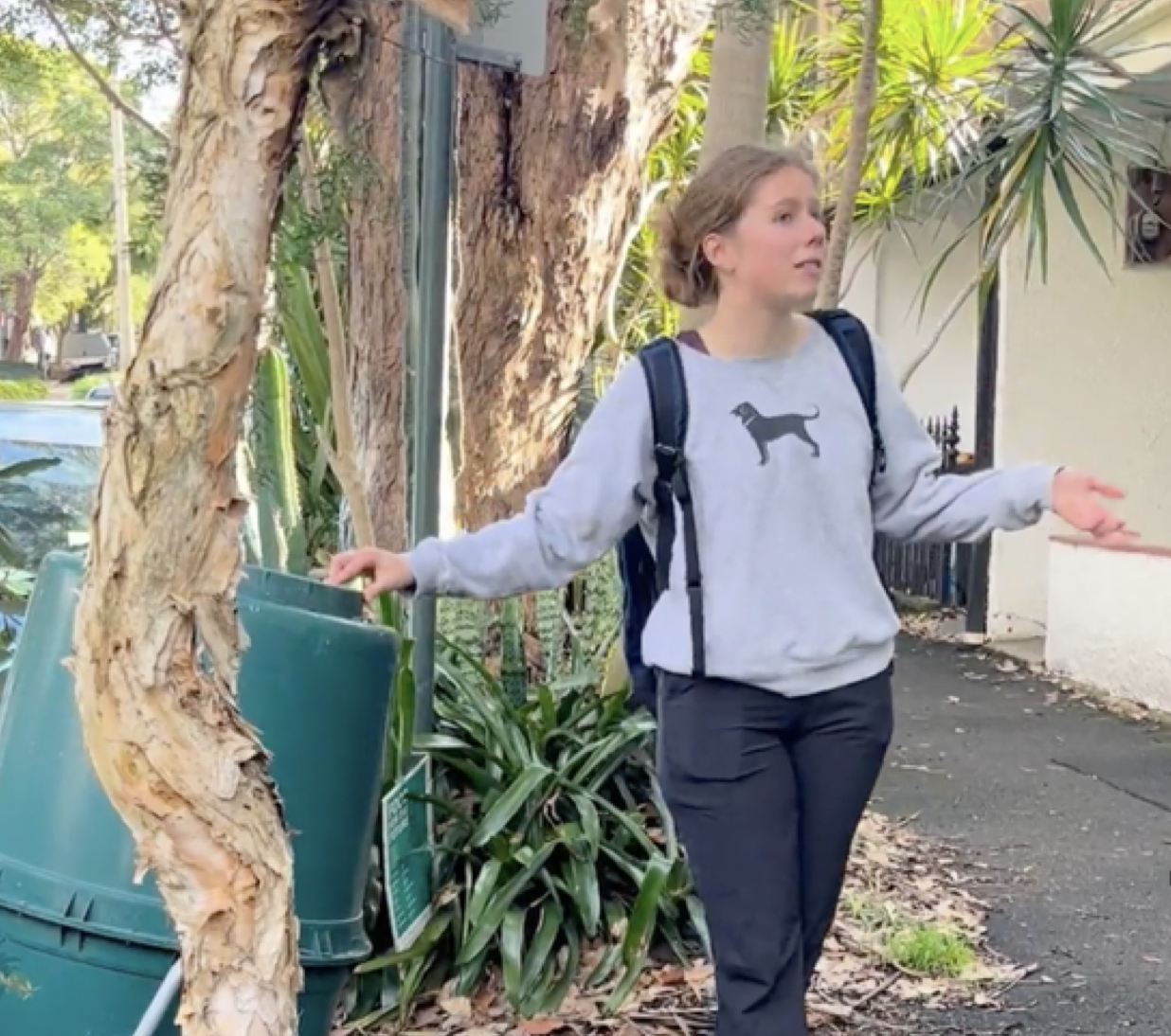• Hadley getting her hands dirty in Chippendale’s footpath gardens
Hadley Flanagan, a United States intern with Sustainable House in Sydney, Australia, tells us why she gets her hands dirty.
Hello!
My name is Hadley Flanagan, and I have spent my summer break (Australian winter) in Sydney working with Michael Mobbs on Coolseats. I am entering my third year at Cornell University studying Environmental Policy and Biology.
Last summer, I worked at a sustainability center in Ithaca, New York. During that internship, I researched and learned various skills, then created lesson plans and taught classes to community members on small changes they could make to lead more sustainable lives.
One large focus of the internship was on composting. I spent many days building three-bay compost systems from old recycled wooden pallets and wire. These were places in the backyards of people already leading sustainable lives who wanted to go further and begin composting. I would then explain the basics of composting and the many benefits, including how composting stops methane and carbon gases damaging Earth’s climate when food waste decays in landfill and waste sites.
• Example of a multi-day compost system at Pocket City Farms, Camperdown, Sydney
Most of what I study in my university classes is about the theory behind environmental studies, the great thinkers (many of whom never went to a university, just lived and learnt by observing, reading, talking, doing), the greatest challenges, and solutions. We get to think about problems and theorize about solutions in long-winded essays, but rarely do we get our hands dirty and work on the ground to make change. Making compost bays and talking to people about their benefits allowed me to live with day to day environmental issues and offer a practical small-scale solution.
While one person (such as me or you) or a group beginning to compost cannot solve our immense environmental problems, a choice we may make to lead a more sustainable life can have large effects. Changing behaviour can influence others around me and you to make similar changes. Then, once sustainable living examples are everywhere, it becomes the norm. When these changes are widespread, policy can follow to support and to grow public interest, and individual change can have a large impact.
The work I hope to do in policy in the future would be futile without public support, and that is achieved through engaging with people, talking to them, and supporting grassroots movements. The work I did last year was only built upon by the work I have done over the past 8-weeks with Coolseats.
• Hadley explaining the tumble compost option on a tour of the Chippendale gardens for local residents and businesses
The main goal of Coolseats is to end food waste by making composting fashionable.
One of the largest barriers I see to the widespread use of composting is misconceptions and bias against what composting does and what it should look like. The dislike or bias is partly a response to the design or look or smell of compost options. Public dislike and fear of worms and bugs leads to an aversion to composting as the process relies on those decomposers. Another large barrier is that many people believe compost will smell as it is a collection of decaying matter. When properly aerated, there should be no odour.
The Coolseat alleviates some of these problems, making composting more appealing. Firstly, the compost is hidden under a seat, keeping the decomposition process out of public view. Secondly, a garden bed surrounds the compost, which has the double benefit of growing food while also offering a space for fragrant plants. Thirdly, the Coolseat reduces watering of plants by over 80% as water is stored below the plants in wicking cells close to the plant roots; no water is lost and labour is avoided due to there being no need for surface watering and evaporation; rich compost juice is harvested to be applied as fertliser on garden beds and plants. Lastly, the bed is properly aerated, ensuring no odour. (All six sides of the composting baskets under the seat are aerated.)
• Hadley showing off an early model of a Coolseat in front of Michael’s house in Chippendale
Composting is a great small-scale and large-scale way to fight back against climate change.
When food waste is placed into trash (garbage) bins, it goes to landfills, where it cannot decompose properly, releasing methane gas into Earth’s open air. Methane is a greenhouse gas with greater Earth warming impacts than carbon dioxide, leading to global warming. Instead, by placing food waste into composting systems, the food can decompose and break down properly, resulting in a nutrient-rich soil. You can use your food waste to make compost, which can grow more food, plants, trees, limiting your carbon footprint. Additionally, in Chippendale the larger and higher tree and plant canopy created by the compost makes streets 15 to 20 degrees cooler in summer than unshaded streets (research, data here).
According to the Coolseats calculator (free to download here), 1kg of food waste composted is equivalent to 1.5kg of carbon dioxide equivalent in avoided emissions entering the atmosphere.
During my internship, My roommates and I collected food scraps in Sydney, depositing them weekly in the Coolseat outside Michaels's house. During our first four weeks, using the calculator, we composted approximately 5.7kg of food waste, equal to about 8.55kg of CO2 equivalent kept out of Earth’s air.
• Image of Hadley’s food waste calculator for her first 4-weeks in Sydney
Composting via Coolseats is the perfect way to start the conversation around composting by limiting aversion towards the process. I’ve seen that when we garden, including compost, in footpath gardens where people live and walk conversations happen, information is shared.
Many cities now have a new FOGO (Food Organics and Garden Organics) program where councils collect household food scraps for commercial composting. Despite success in some suburbs, The Sydney Morning Herald reported in 2021 that FOGO programs faced cost and implementation barriers that limited large-scale usage. And in 2023 the ABC news reported that FOGO is “overwhelmed by plastics”.
Even though FOGO programs have great potential, large-scale adoption of these programs still seems far off. Showing public support for food waste programs is the first step to pushing governments to adopt changes, and Coolseats are a great way to start that process.
Working with Michael on Coolseats has broadened my perspective on the role of individual sustainable changes in large movements.
The most enjoyable experiences I had throughout my internship involved talking with the public about Coolseats and their uses and benefits. People are interested in engaging in sustainability, and even just putting composting options such as Coolseats in the public arena is a good first step. From my perspective, one of the largest benefits to Coolseats is not the environmental benefits but the role it can play as an educational tool. Coolseats show people a glimpse into a sustainable future and inspire people to make lifestyle changes to help get us there.
• Hadley sitting on the recently installed Coolseat at Pocket City Farms







